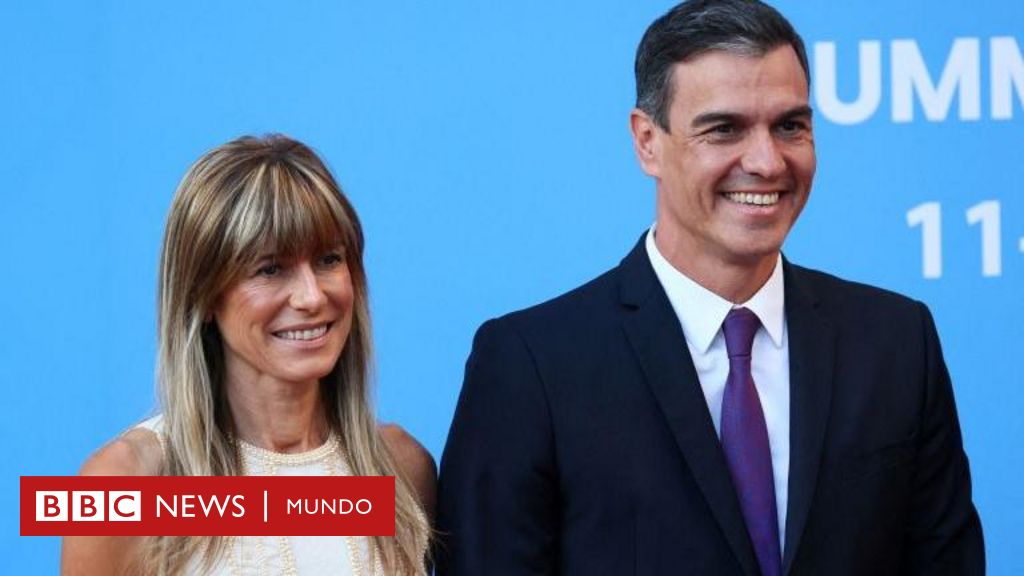The president of the Spanish government, Pedro Sánchez, announced this Wednesday the suspension of his public activities to consider his possible resignation from office after a Madrid court accepted a complaint against his wife, Begoña Gómez, for a possible traffic crime. of influences.
In an open letter to citizens, Sánchez stated: “I need to stop and reflect. “I urgently need to answer the question of whether it is worth it, whether I should continue leading the Government or give up this honor.”
The leader of the Spanish Socialist Workers Party (PSOE) attributes the complaint against his wife to “an operation of harassment and demolition” of the “right and extreme right” with the aim of making him “faint politically and personally by attacking” his wife.
And he points to his opposition rivals on the right of the political arc, the leader of the conservative Partido Popular, Alberto Núñez-Feijoo; and the far-right Vox, Santiago Abascal, as “necessary collaborators” of a campaign that seeks to “dehumanize and delegitimize the political adversary through complaints that are as scandalous as they are false.”
Sánchez assured in the letter that she published on her X social network account that she “lives helplessly with the mud that is spread over her day in and day out” and announced that she will appear next Monday to announce her decision regarding her continuity in the post.
The content of the complaint
The complaint admitted by the Investigative Court Number 41 of Madrid against Begoña Gómez states that, “taking advantage” of her relationship with the President of the Government, she would have recommended or endorsed by letter of recommendation with her signature to businessmen who bid for public tenders." .
The letter also points out that one of the companies that obtained public funds organized years later a master’s degree in a university program that she directs and that another of them, the airline Air Europa, agreed to allocate funds for an innovation center in Africa that was also at the same time. charge of Sánchez’s wife.
The Spanish president assured that his wife will defend herself in court against “facts that are as apparently scandalous as they are inconsistent.”
The complaint was filed by the Colectivo de Funcionarios Públicos Manos Limpias, an organization often involved in controversy because its founder is a former far-right militant and which has gained notoriety by filing judicial complaints about alleged cases of political corruption that have frequently finished archived.
In the case of Begoña Gómez, the investigating judge Juan Carlos Peinado has so far limited himself to ordering the opening of proceedings and summoning as witnesses the directors of the media that have disseminated the journalistic publications on which the complaint is based, some with an editorial line very critical of the Pedro Sánchez government.
Alberto Núñez Feijóo, leader of the Partido Popular, the main opposition force, accused Sánchez of “dereliction of duties” for announcing that he is taking a few days until Monday to decide whether to continue in office.
“If you have nothing to fear, why don’t you explain?” Feijóo asked him, who also reproached him for what he considered an attempt to “victimize” himself.
The support of the independentists
Hours before Sánchez’s letter was made public, the PP had demanded explanations from him in Parliament, to which the president of the government responded by saying that “on a day like today and after the news that I have learned, despite everything I continue believing in the justice of my country”.
Spanish media reported that Sánchez had left Parliament this Wednesday heading to his Madrid residence visibly upset.
Sánchez’s decision to suspend his public events comes at a tense time for the PSOE, ahead of the European Parliament elections in June and elections in the Catalonia region next month.
Sánchez was precisely due to participate this Thursday in the start of the socialists’ campaign in Barcelona ahead of the Catalan elections on May 12.
The Spanish president managed to be sworn back into office a few months ago with the support of two Catalan separatist parties, which agreed to give him their votes in exchange for an amnesty for those accused and convicted of the independence process in Catalonia that culminated in a referendum of independence in October 2017.
Without the support of Esquerra Republicana de Catalunya (ERC) and Junts per Catalunya (JxCat), he would not have been able to remain in power.
Opposition parties are outraged by the amnesty, which also means that former Catalan president Carles Puigdemont can run in the May 12 elections, seven years after he escaped from justice by moving to Belgium.
Puigdemont still faces a terrorism case, but believes the amnesty will allow him to return to Spain.
Google Translate


